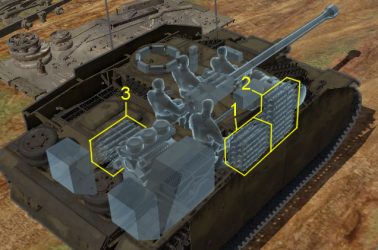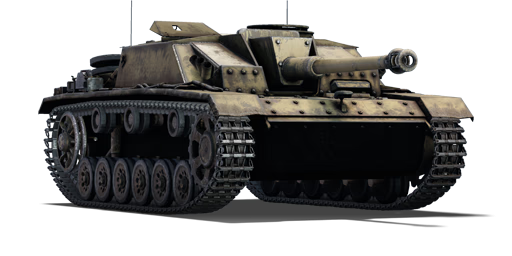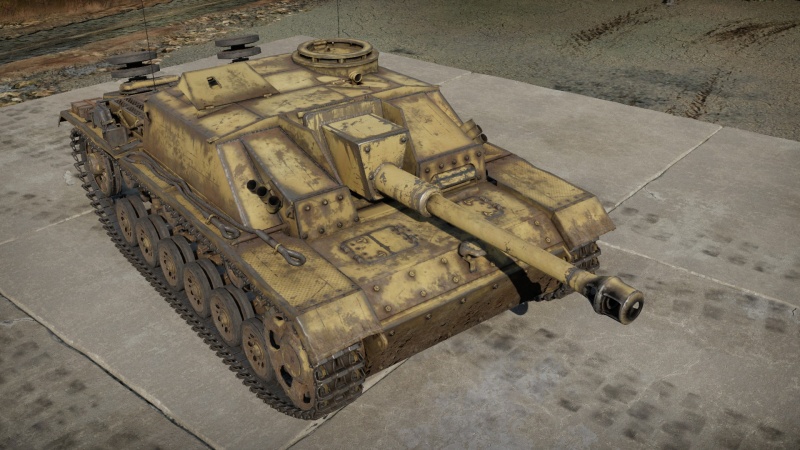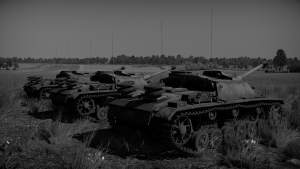Difference between revisions of "StuG III G (Italy)"
Colok76286 (talk | contribs) (Edits) |
(→Description) |
||
| (6 intermediate revisions by 3 users not shown) | |||
| Line 11: | Line 11: | ||
== Description == | == Description == | ||
<!-- ''In the description, the first part should be about the history of the creation and combat usage of the vehicle, as well as its key features. In the second part, tell the reader about the ground vehicle in the game. Insert a screenshot of the vehicle, so that if the novice player does not remember the vehicle by name, he will immediately understand what kind of vehicle the article is talking about.'' --> | <!-- ''In the description, the first part should be about the history of the creation and combat usage of the vehicle, as well as its key features. In the second part, tell the reader about the ground vehicle in the game. Insert a screenshot of the vehicle, so that if the novice player does not remember the vehicle by name, he will immediately understand what kind of vehicle the article is talking about.'' --> | ||
| − | The | + | During the advance of the Allies on Italian territory in 1943, Germany began to send different types of vehicles to Italy (RSI) to increase their effectiveness and in turn improve the defence of the territory, including aircraft, light vehicles, transport vehicles, cannons, and eventually tanks. In particular, Pz.IV G, Pz.III N, and eventually StuG III G were sent. These were used in the 1st Armoured Division Black Shirts "M" formed in the same year and was divided into three companies, the third of which was equipped with 12 StuG III G, with 2 particular differences: the removal of the side skirts, and the addition of smoke launchers on both sides. The Italian StuG III Gs did not see combat because the division was still in training, and would eventually be recovered by the Germans only to be captured by the Allies during the advance into Germany. |
| + | |||
| + | Introduced in [[Update "Ixwa Strike"]], the Italian StuG III G is almost the same as the German one however it has its particular differences such as the removal of the side skirts, and the addition of 2 triple smoke grenade launchers, which can be useful to escape from dangerous situations or to confuse the enemy. Thanks to the powerful cannon, you can destroy any target you meet at your level, always try to position yourself in well-protected places so you can destroy as many targets as possible. | ||
== General info == | == General info == | ||
| Line 39: | Line 41: | ||
* Suspension wheels and torsion bars are 15 mm thick while tracks are 20 mm thick. | * Suspension wheels and torsion bars are 15 mm thick while tracks are 20 mm thick. | ||
| − | |||
* The belly of the {{PAGENAME}} is 30 mm thick. | * The belly of the {{PAGENAME}} is 30 mm thick. | ||
| Line 56: | Line 57: | ||
{{Specs-Tank-Weapon|1}} | {{Specs-Tank-Weapon|1}} | ||
<!-- ''Give the reader information about the characteristics of the main gun. Assess its effectiveness in a battle based on the reloading speed, ballistics and the power of shells. Do not forget about the flexibility of the fire, that is how quickly the cannon can be aimed at the target, open fire on it and aim at another enemy. Add a link to the main article on the gun: <code><nowiki>{{main|Name of the weapon}}</nowiki></code>. Describe in general terms the ammunition available for the main gun. Give advice on how to use them and how to fill the ammunition storage.'' --> | <!-- ''Give the reader information about the characteristics of the main gun. Assess its effectiveness in a battle based on the reloading speed, ballistics and the power of shells. Do not forget about the flexibility of the fire, that is how quickly the cannon can be aimed at the target, open fire on it and aim at another enemy. Add a link to the main article on the gun: <code><nowiki>{{main|Name of the weapon}}</nowiki></code>. Describe in general terms the ammunition available for the main gun. Give advice on how to use them and how to fill the ammunition storage.'' --> | ||
| − | {{main|StuK40 (75 mm)}} | + | {{main|StuK40 L48 (75 mm)}} |
{| class="wikitable" style="text-align:center" width="100%" | {| class="wikitable" style="text-align:center" width="100%" | ||
|- | |- | ||
| − | ! colspan="5" | [[StuK40 (75 mm)|75 mm StuK40]] || colspan="5" | Turret rotation speed (°/s) || colspan="4" | Reloading rate (seconds) | + | ! colspan="5" | [[StuK40 L48 (75 mm)|75 mm StuK40 L48]] || colspan="5" | Turret rotation speed (°/s) || colspan="4" | Reloading rate (seconds) |
|- | |- | ||
! Mode !! Capacity !! Vertical !! Horizontal !! Stabilizer | ! Mode !! Capacity !! Vertical !! Horizontal !! Stabilizer | ||
| Line 75: | Line 76: | ||
==== Ammunition ==== | ==== Ammunition ==== | ||
| − | { | + | {{:StuK40 L48 (75 mm)/Ammunition|PzGr 39, Hl.Gr 38B, PzGr 40, Sprgr. 34, K.Gr.Rot Nb.}} |
| − | |||
| − | |||
| − | |||
| − | |||
| − | |||
| − | |||
| − | |||
| − | |||
| − | |||
| − | |||
| − | |||
| − | |||
| − | |||
| − | |||
| − | |||
| − | |||
| − | |||
| − | |||
| − | |||
| − | |||
| − | |||
| − | |||
| − | |||
| − | |||
| − | |||
| − | |||
| − | |||
| − | |||
| − | |||
| − | |||
| − | |||
| − | | PzGr 39 | ||
| − | |||
| − | |||
| − | |||
| − | |||
| − | |||
| − | |||
| − | |||
| − | |||
| − | |||
| − | |||
| − | |||
| − | |||
| − | |||
| − | |||
| − | |||
| − | |||
| − | |||
| − | |||
| − | |||
| − | |||
| − | |||
| − | |||
==== [[Ammo racks]] ==== | ==== [[Ammo racks]] ==== | ||
| Line 165: | Line 112: | ||
* Low silhouette | * Low silhouette | ||
* Powerful 75 mm cannon | * Powerful 75 mm cannon | ||
| + | * Boxy design makes it excellent for angling | ||
'''Cons:''' | '''Cons:''' | ||
* Fixed casemate superstructure restricts gun movement to the front | * Fixed casemate superstructure restricts gun movement to the front | ||
| − | * | + | * Mediocre mobility |
| + | * Left side is vulnerable to crew knockouts | ||
== History == | == History == | ||
| Line 182: | Line 131: | ||
;Skins | ;Skins | ||
| + | |||
* [https://live.warthunder.com/feed/camouflages/?vehicle=it_stug_III_ausf_G Skins and camouflages for the {{PAGENAME}} from live.warthunder.com.] | * [https://live.warthunder.com/feed/camouflages/?vehicle=it_stug_III_ausf_G Skins and camouflages for the {{PAGENAME}} from live.warthunder.com.] | ||
Latest revision as of 21:29, 23 April 2023
| This page is about the tank destroyer StuG III G (Italy). For other versions, see StuG III (Family). |
Contents
Description
During the advance of the Allies on Italian territory in 1943, Germany began to send different types of vehicles to Italy (RSI) to increase their effectiveness and in turn improve the defence of the territory, including aircraft, light vehicles, transport vehicles, cannons, and eventually tanks. In particular, Pz.IV G, Pz.III N, and eventually StuG III G were sent. These were used in the 1st Armoured Division Black Shirts "M" formed in the same year and was divided into three companies, the third of which was equipped with 12 StuG III G, with 2 particular differences: the removal of the side skirts, and the addition of smoke launchers on both sides. The Italian StuG III Gs did not see combat because the division was still in training, and would eventually be recovered by the Germans only to be captured by the Allies during the advance into Germany.
Introduced in Update "Ixwa Strike", the Italian StuG III G is almost the same as the German one however it has its particular differences such as the removal of the side skirts, and the addition of 2 triple smoke grenade launchers, which can be useful to escape from dangerous situations or to confuse the enemy. Thanks to the powerful cannon, you can destroy any target you meet at your level, always try to position yourself in well-protected places so you can destroy as many targets as possible.
General info
Survivability and armour
Armour type:
- Rolled homogeneous armour (hull, superstructure)
| Armour | Front (Slope angle) | Sides | Rear | Roof |
|---|---|---|---|---|
| Hull | 80 mm (50°) Lower glacis 80 mm (19°) Lower plate 30 mm (76°) Bottom junction glacis |
30 + 5* mm (*Side skirts) | 50 mm (15°) Upper plate 50 mm Lower plate 30 mm (66°) Bottom junction glacis |
30 mm (4°) Front part 16 mm Engine compartment 30 mm (13°) Rear part |
| Superstructure | 80 mm (0-11°) Upper plate 80 mm (1-10°) Gun mantlet 30 mm (69°) Upper glacis 30 mm (50°) Side glacis overhanging the tracks |
30 + 5* mm (*Side skirts) | 30 mm | 11 mm |
| Cupola | 50 mm (cylindrical) | 11 mm | ||
Notes:
- Suspension wheels and torsion bars are 15 mm thick while tracks are 20 mm thick.
- The belly of the StuG III G (Italy) is 30 mm thick.
Mobility
| Game Mode | Max Speed (km/h) | Weight (tons) | Engine power (horsepower) | Power-to-weight ratio (hp/ton) | |||
|---|---|---|---|---|---|---|---|
| Forward | Reverse | Stock | Upgraded | Stock | Upgraded | ||
| Arcade | 44 | 8.2 | 24.4 | 426 | 525 | 17.46 | 21.52 |
| Realistic | 40 | 7.5 | 265 | 300 | 10.86 | 12.3 | |
Modifications and economy
Armaments
Main armament
| 75 mm StuK40 L48 | Turret rotation speed (°/s) | Reloading rate (seconds) | |||||||||||
|---|---|---|---|---|---|---|---|---|---|---|---|---|---|
| Mode | Capacity | Vertical | Horizontal | Stabilizer | Stock | Upgraded | Full | Expert | Aced | Stock | Full | Expert | Aced |
| Arcade | 54 | -6°/+17° | ±10° | N/A | 13.2 | 18.3 | 22.2 | 24.6 | 26.1 | 7.67 | 6.78 | 6.25 | 5.90 |
| Realistic | 8.9 | 10.5 | 12.8 | 14.1 | 15.0 | ||||||||
Ammunition
| Penetration statistics | |||||||
|---|---|---|---|---|---|---|---|
| Ammunition | Type of warhead |
Penetration @ 0° Angle of Attack (mm) | |||||
| 10 m | 100 m | 500 m | 1,000 m | 1,500 m | 2,000 m | ||
| PzGr 39 | APCBC | 145 | 143 | 130 | 116 | 104 | 93 |
| Hl.Gr 38B | HEAT | 80 | 80 | 80 | 80 | 80 | 80 |
| PzGr 40 | APCR | 182 | 177 | 159 | 140 | 122 | 107 |
| Sprgr. 34 | HE | 10 | 10 | 10 | 10 | 10 | 10 |
| Shell details | ||||||||||||
|---|---|---|---|---|---|---|---|---|---|---|---|---|
| Ammunition | Type of warhead |
Velocity (m/s) |
Projectile mass (kg) |
Fuse delay (m) |
Fuse sensitivity (mm) |
Explosive mass (TNT equivalent) (g) |
Ricochet | |||||
| 0% | 50% | 100% | ||||||||||
| PzGr 39 | APCBC | 770 | 6.8 | 1.2 | 14 | 28.9 | 48° | 63° | 71° | |||
| Hl.Gr 38B | HEAT | 450 | 4.4 | 0.05 | 0.1 | 872.1 | 62° | 69° | 73° | |||
| PzGr 40 | APCR | 990 | 4.1 | - | - | - | 66° | 70° | 72° | |||
| Sprgr. 34 | HE | 550 | 5.74 | 0 | 0.1 | 686 | 79° | 80° | 81° | |||
| Smoke shell characteristics | ||||||
|---|---|---|---|---|---|---|
| Ammunition | Velocity (m/s) |
Projectile mass (kg) |
Screen radius (m) |
Screen deploy time (s) |
Screen hold time (s) |
Explosive mass (TNT equivalent) (g) |
| K.Gr.Rot Nb. | 540 | 6.2 | 13 | 5 | 20 | 50 |
Ammo racks

| Full ammo |
1st rack empty |
2nd rack empty |
3rd rack empty |
Visual discrepancy |
|---|---|---|---|---|
| 54 | 40 (+14) | 17 (+37) | 1 (+53) | No |
Notes:
- Racks disappear after you've used all shells in the rack.
- Pack 17 (+37) shells into battle to deplete your right flank of ammo (racks 1 & 2 emptied).
Usage in battles
The StuG III G is best played as a support vehicle. Like the previous Semovente variants, it has excellent armour and can be quite a potent vehicle that enemies will often find hard to deal with from long ranges. Due to this, it's advised to go to a good spot overlooking common enemy positions at the beginning of the match. Make sure enemies don't breach your defenses, as the sides of the tank are a weak point from any range. Another downside of playing this vehicle is when it's brought close to the front lines (for example when capturing points). The StuG III G's armour will not be adequate against the close-range power of most vehicles. Most shots at close range will more than likely penetrate the armour, which will usually result in the vehicle being destroyed due to the small interior layout. So it is vital to maintain situational awareness when playing in a more risky playstyle. Make sure to support teammates from the flanks, attack from long ranges, and never close in the distance even for objectives unless necessary. If properly concealed, the enemy will never know where they are attacked as they concentrate their assault forwards.
The StuG III G has no defense against enemy aircraft, so if you see one heading towards you, it probably would be in you best interest to look for cover. Unlike the German variant, the Italian StuG III G does not have side skirts, so artillery might at times damage your tracks. In terms of armaments, the StuG III G is armed with the German-made 75 mm StuK40, a reliable cannon with plenty of great ammo options. Do carefully consider how many rounds are brought, as bringing more than necessary puts the vehicle at greater risk of being destroyed in one shot. In conclusion, be careful, try not to get detected by the enemy and find a place where the StuG III G can be in cover whilst engaging enemy tanks.
Pros and cons
Pros:
- Good frontal armour
- Low silhouette
- Powerful 75 mm cannon
- Boxy design makes it excellent for angling
Cons:
- Fixed casemate superstructure restricts gun movement to the front
- Mediocre mobility
- Left side is vulnerable to crew knockouts
History
The story of the StuG begins during the interwar period of Germany, there was a clear missing asset for the German army, a vehicle which could fit the role of a self-propelled gun, which followed the same style of doctrine thanks to combat experiences in World War I. Overall, there was a major need for a mobile artillery piece which could keep up with the German infantry and fight enemy fortifications with a direct-fire assault role. After a few prototypes and refinement to the designs, the StuG III would officially enter full-scale production from January 1940, and would serve in many countries up till the end of the war in April 1945. The main reason it saw such extensive use was due to the many upgrades done on the vehicle to increase serviceability and it being a low cost platform to maintain operational. In terms of survivability, the StuG III featured about 50 mm of armour on the front, but about 30 mm of armour everywhere else, this was upgraded to 80 mm as the war progressed. The StuG in German service also had access Schürzen armour plates installed on the hull to protect the weaker hull sides against anti-tank rifles and HEAT rounds.
The Italian versions would remove this, as was the case for many Italian vehicles. In terms of the Italian story of this tank, Germany had initially supplied 12 units of the Panzer IV G to Italy during the late stages of the Second World War. With these tanks, as well as 12 newly-received StuG III Gs, the 1st Armored Division Black Shirts "M" (for "Mussolini") was formed in May 1943, mainly starting from the very few survivors of the previous MVSN Battalions M who had been repatriated from the Russian front. The division was organised in 3 companies, with the third comprising the 12 StuGs which were armed with 7.5 cm L/48 cannons. Unlike their German counterpart, the side-skirts were removed from the tanks, but surprisingly were also modified with a smoke grenade launcher, installed onto the turret. The Italian StuGs would be painted in a light tan colour with the Divisione "M" logo usually painted on the turret. They didn't see any action during the war, most of them were still undergoing training at the time and most, if not all of the tanks would end up in Allied hands shortly after the war.
Media
- Skins
See also
Links to the articles on the War Thunder Wiki that you think will be useful for the reader, for example:
- reference to the series of the vehicles;
- links to approximate analogues of other nations and research trees.
External links
Paste links to sources and external resources, such as:
- topic on the official game forum;
- other literature.
| Italy tank destroyers | |
|---|---|
| Italy | |
| M41 | 75/18 M41 · 75/32 M41 · 90/53 M41M |
| M42 | 75/34 M42 |
| M43 | 105/25 M43 · M43 "G.C.Leoncello" · 75/34 M43 · 75/46 M43 |
| Wheeled | Lancia 3Ro (100/17) · AS 42/47 · Breda 90/53 · Breda 501 |
| Other | L3/33 CC · 47/32 L40 |
| Germany | ▄StuG III G |
| USA | M36B1 · ▄M109G · M113A1 (TOW) |
| Hungary | |
| Zrínyi | Zrinyi I · Zrinyi II |
| USSR | ◔2S1 |






